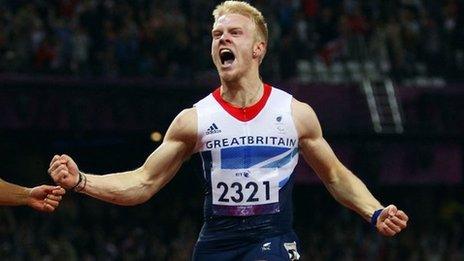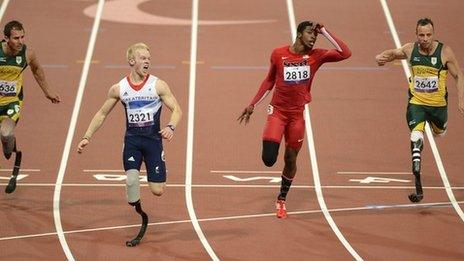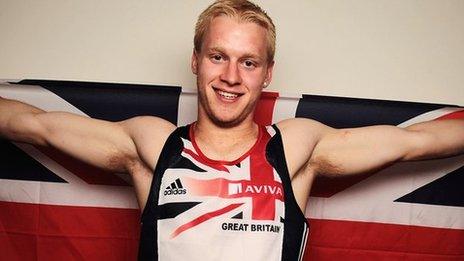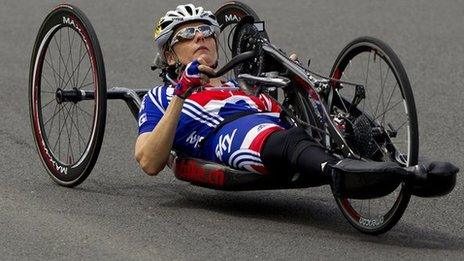Jonnie Peacock, star of the Paralympics, excited by return
- Published
Peacock misses thrill of competition
It is a name that seemed almost destined to be the centre of attention.
Last summer, Jonnie Peacock had 80,000 spectators chanting for him and nearly seven million Britons gripped to their sofas. The single-leg amputee promptly blazed to 100m gold in perhaps the defining race of the London Paralympics.
Eight months on, it is back to reality. At a windswept Loughborough, the 19-year-old is limbering up on the training track. Showers are scudding across the skyline.
Peacock smiles, as he nearly always does. He has experienced many things since September: an operation; a new running blade; a new coach; a new training base; and the usual post-2012 comedown. Almost everything, in fact, apart from a race.
But that is about to change as he prepares to make his comeback at the BT Great CityGames, in which he will compete against fellow Paralympians on a specially laid track in central Manchester.
Peacock will line up in the 100m against the USA's double Paralympic medallist Blake Leeper, South Africa's Arnu Fourie and Dutchman Ronald Hertog, while Alan Oliveira, the Brazilian who beat Oscar Pistorius to 200m gold in London, will race in the longer sprint as Paralympians take part in the Great CityGames in Manchester for the first time.
Peacock sums up his feelings as "excited nerves". "It doesn't feel like eight months," he adds. "I'm looking forward to getting back out there, but I'm anxious to know what sort of shape I'm in.
"It's just so unknown at the moment because of so many variables changing. For me, this is really a year to get settled and get stuck in."
The uncertainty is a result of ankle surgery - "it just needed a good clean out" - and his new blade, which bucks the current trend by being slightly shorter than his previous one.
"The other one was a tiny bit too long," explains Peacock. "I obviously grew and got stronger, and different muscles were being used. My alignment was slightly out. I'm running a lot smoother now."
Like other athletes, Peacock has also had to deal with sudden stardom. His lasting memory of London is "just crossing the line and being so excited and so scared at the same time".
He laughs at the suggestion he is famous. "But it's good, because a year ago, I would never expect that someone who won the Paralympics would be this recognisable, so for me it's just a big relief to see how the sport's progressed," he adds.
"I think it's getting taken more seriously as sport now, which as athletes we want to see."
That new strength-in-depth of disability athletics is about to be tested because the sport will be missing its marquee name this summer, with Pistorius awaiting a murder trial in South Africa.
I suggest to Peacock that he could be the sport's new face. Again, he smiles. "I wouldn't see it as that. I think there are a lot of faces now - athletes the fans can get to know. Obviously, I love competing and I'll do anything I need to for my sport."
Inevitably, even for one of sport's sunnier characters, there was a touch of the post-Games blues. "You've been training for three years to do something - every single race has been building up to it - and your life feels as if it has stopped after 2012," he explains.
But now the competitive edge is back for Peacock, who admits he has "always hated losing".
"Even when I was with my sisters at home, I never liked losing any games on the Wii," he adds. "I'd be there for hours afterwards trying to beat the highest score. Unfortunately, that's the kind of person I am, but it does help me with a bit of drive when it comes to training for athletics."
Peacock's primary focus this year is the World Championships in July. How fast can he go?
"It's the question I always used to ask my coach and I would never get a clear answer," grins the world record-holder.
"Obviously, it's unlikely that 10.85 is the fastest that I'll go, but we don't know what the best will be. It could be a low 10.8. It could be a high 10.7. It could be faster. The only way is to keep watching. Hopefully, we'll see some fast times pop up."
- Published2 May 2013

- Published12 December 2012

- Published7 September 2012

- Published1 July 2012

- Published5 September 2016
